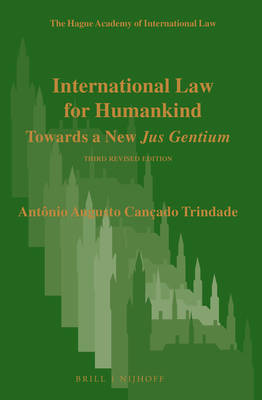
- Afhalen na 1 uur in een winkel met voorraad
- Gratis thuislevering in België vanaf € 30
- Ruim aanbod met 7 miljoen producten
- Afhalen na 1 uur in een winkel met voorraad
- Gratis thuislevering in België vanaf € 30
- Ruim aanbod met 7 miljoen producten
Zoeken
Omschrijving
Fully updated and covering the new challenges and dangers which have emerged since publication of the previous edition, the new 3rd Edition of International Law for Humankind builds on the revised and adapted text of a General Course on Public International Law delivered by the Author at The Hague Academy of International Law.
Professor Cançado Trindade develops his Leitmotiv of identification of a corpus juris increasingly oriented to the fulfillment of the needs and aspirations of human beings, of peoples and of humankind as a whole. With the overcoming of the purely inter-State dimension of the discipline of the past, international legal personality has expanded, so as to encompass nowadays, besides States and international organizations, also peoples, individuals and humankind as subjects of International Law. The growing consciousness of the need to pursue universally-shared values has brought about a fundamental change in the outlook of International Law in the last decades, drawing closer attention to its foundations and, parallel to its formal sources, to its material source (the universal juridical conscience). He examines the conceptual constructions of this new International Law and identifies basic considerations of humanity permeating its whole corpus juris, disclosing the current processes of its humanization and universalization. Finally, he addresses the construction of the international rule of law, acknowledging the need and quest for international compulsory jurisdiction, in the move towards a new jus gentium, the International Law for humankind.
Professor Cançado Trindade develops his Leitmotiv of identification of a corpus juris increasingly oriented to the fulfillment of the needs and aspirations of human beings, of peoples and of humankind as a whole. With the overcoming of the purely inter-State dimension of the discipline of the past, international legal personality has expanded, so as to encompass nowadays, besides States and international organizations, also peoples, individuals and humankind as subjects of International Law. The growing consciousness of the need to pursue universally-shared values has brought about a fundamental change in the outlook of International Law in the last decades, drawing closer attention to its foundations and, parallel to its formal sources, to its material source (the universal juridical conscience). He examines the conceptual constructions of this new International Law and identifies basic considerations of humanity permeating its whole corpus juris, disclosing the current processes of its humanization and universalization. Finally, he addresses the construction of the international rule of law, acknowledging the need and quest for international compulsory jurisdiction, in the move towards a new jus gentium, the International Law for humankind.
Specificaties
Betrokkenen
- Auteur(s):
- Uitgeverij:
Inhoud
- Aantal bladzijden:
- 770
- Taal:
- Engels
- Reeks:
- Reeksnummer:
- nr. 10
Eigenschappen
- Productcode (EAN):
- 9789004425200
- Verschijningsdatum:
- 5/03/2020
- Uitvoering:
- Paperback
- Formaat:
- Trade paperback (VS)
- Afmetingen:
- 163 mm x 239 mm
- Gewicht:
- 1156 g

Alleen bij Standaard Boekhandel
+ 317 punten op je klantenkaart van Standaard Boekhandel
Beoordelingen
We publiceren alleen reviews die voldoen aan de voorwaarden voor reviews. Bekijk onze voorwaarden voor reviews.








